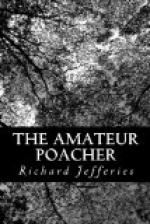If the pond was a haunt of his, it was too near the young partridges, which were weakly that season. A kestrel is harmless compared to a crow. Surely the translators have wrongly rendered Don Quixote’s remark that the English did not kill crows, believing that King Arthur, instead of dying, was by enchantment turned into one, and so fearing to injure the hero. Must he not have meant a rook? [Note: It has since been pointed out to me that the Don may have meant a raven]
Soon afterwards something moved out of the mound into the meadow a long distance up: it was a hare. He came slowly along beside the hedge towards me—now stopping and looking into it as if seeking a convenient place for a form, having doubtless been disturbed from that he had first chosen. It was some minutes before he came within range: had I been on the ground most likely he would have scented me, the light air going that way; but being in, the tree the wind that passed went high over him. For this reason a tree ambush is deadly. It was necessary to get the line of sight clear of twigs, which check and divert shot, and to take a steady aim; for I had no second barrel, no dog, and had to descend the tree before running. Some leaves were blackened by the flame: the hare simply fell back, stretched his hind legs, quivered, and lay still. Part of the leaf of a plant was fixed in his teeth; he had just had a nibble.
With this success I was satisfied that day; but the old oak was always a favourite resort, even when nothing particular was in hand. From thence, too, as a base of operations, we made expeditions varying in their object with the season of the year.
Some distance beyond the stunted oak the thick blackthorn hedge was succeeded by a continuous strip of withy-bed bordering the brook. It often occurred to us that by entering these withies it would be possible to reconnoitre one side of Southlands; for the stream skirted the lower grounds: the tall willows would conceal any one passing through them. So one spring morning the attempt was made.
It was necessary to go on hands and knees through the mowing grass for some yards while passing an open space where the blackthorn cover ended, and then to leap a broad ditch that divided the withy-beds from the meadow. The lissom willow wands parted easily and sprang back to their places behind, leaving scarce a trace. Their slender tops rose overhead; beneath, long dead grasses, not yet quite supplanted by the spring growth, filled the space between. These rustled a little under foot, but so faint a sound could scarcely have been audible outside; and had any one noticed it it would have been attributed to a hare or a fox moving: both are fond of lying in withy-beds when the ground is dry.




